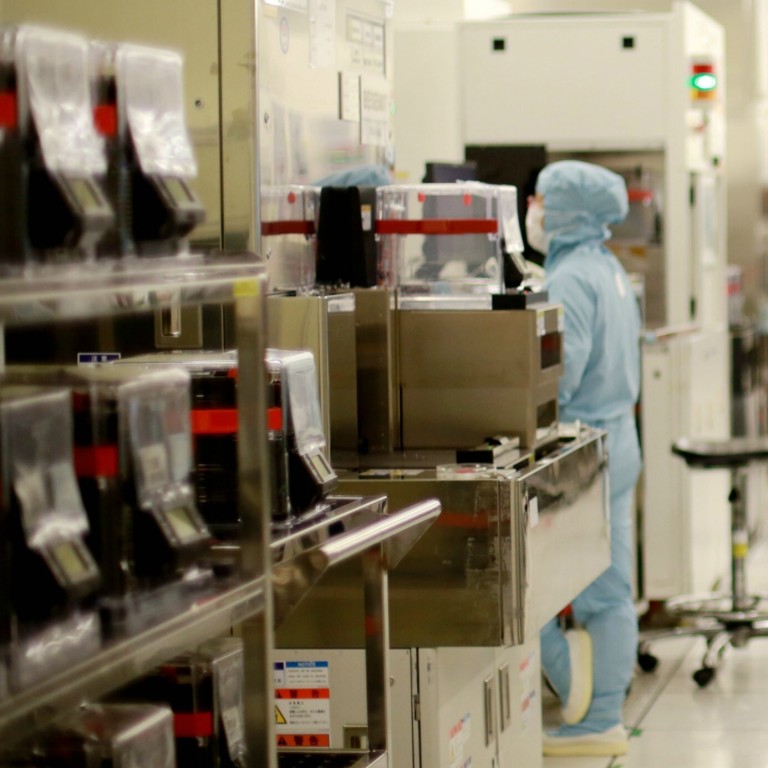
US threat to target China’s biggest chip maker SMIC risks undermining drive to boost domestic tech sector
- White House considers adding manufacturer to blacklist that would force US suppliers to apply for an export licence
- Impact on Chinese technology firms could hit everything from smartphones to missile guidance systems
The United States has threatened to target China’s top chip maker in a move that may slow the country’s efforts to develop critical technology at home.
The Trump administration is considering whether to add Semiconductor Manufacturing International Corporation (SMIC) to a trade blacklist, which would force US suppliers to seek a difficult-to-obtain licence before shipping to the company, a Pentagon spokeswoman told Reuters on Friday.
While the Pentagon did not outline the reasons for the action, SMIC’s relationship to the Chinese military is under scrutiny, one current and two former US officials told Reuters.
Analysts said restricting SMIC’s access to US suppliers could disrupt China’s efforts to develop its own domestic integrated circuit (IC) and software industries, which would hit everything from smartphones to 5G base stations and missile guidance systems.
“A potential US trade restriction could disrupt SMIC’s supply chain, affecting its production in CMOS sensors, smartphone fingerprints products, and power management integrated circuits-related products,” said Eric Tseng, the chief executive of Taiwan-based semiconductor research firm Isaiah Capital & Research.
Established in 2000 and now the country’s largest chip maker, SMIC raised 46.3 billion yuan (US$6.8 billion) in its IPO in Shanghai in July – more than double its initial target – in what is expected to be China’s largest offering in 10 years.
US sanctions drive up Huawei handset prices as company grapples with impending chip shortage
Currently the company and Shanghai-based Huahong, are the only two foundries in China that can produce chips using the 28-nanometre processing node, one of the most advanced available in China.
Last month, the State Council, the Chinese cabinet, issued new policies to support the sector, including tax exemptions, a streamlined review process for company listing and stronger intellectual property protection.
Stewart Randall, director of operations for electronics and embedded Software at Intralink, a Shanghai-based consultancy, said the threat to blacklist SMIC meant any Chinese company that reached a similar size “would be in the US crosshairs, which means China has no choice but to try somehow to develop all equipment in China [and] have a closed system”.
Last month US Secretary of State Mike Pompeo called for a “Clean Network to safeguard America’s assets” against the threat of Chinese infiltration and form an “end-to-end communication path that does not use any transmission, control, computing, or storage equipment from untrusted IT vendors, such as Huawei and ZTE”.
The US has recently moved to ban the popular Chinese-owned apps TikTok and WeChat and has threatened to restrict the operations of the e-commerce giant Alibaba, which also owns the South China Morning Post.
Last month it also introduced sanctions that restrict any foreign semiconductor company from selling chips developed or produced using US software or technology to Huawei, without first obtaining a licence to do so.
China could weaponise drug exports to retaliate against US chip restrictions, Beijing adviser says
The restrictions mean the telecoms giant is at risk of running out of the most advanced chips if it cannot find an alternative supplier and the company’s founder Ren Zhengfei said recently it had to change a multitude of parts and tweak algorithms in its products to cope with Washington’s restrictions.
Cameron Johnson, adjunct faculty instructor at New York University and a partner at Tidal Wave Solution, said he expected potential US restrictions on SMIC to send ripples across global supply chains and businesses.
“It does affect products, whether it’s Huawei phones or SMIC’s (products), it takes a lot of technologies to put them into everything from computers to satellites,” Johnson said. “I think you are only going to see more and more of this happening as things progress, it doesn’t matter if it’s the Trump administration or Biden administration, it will continue to be challenging.”
In a statement SMIC said any suggestion it had ties to the Chinese military was a “false accusation”. It continued: “The company is in complete shock ... nevertheless, SMIC is open to sincere and transparent communication with the US Government agencies in hope of resolving potential misunderstandings.”


